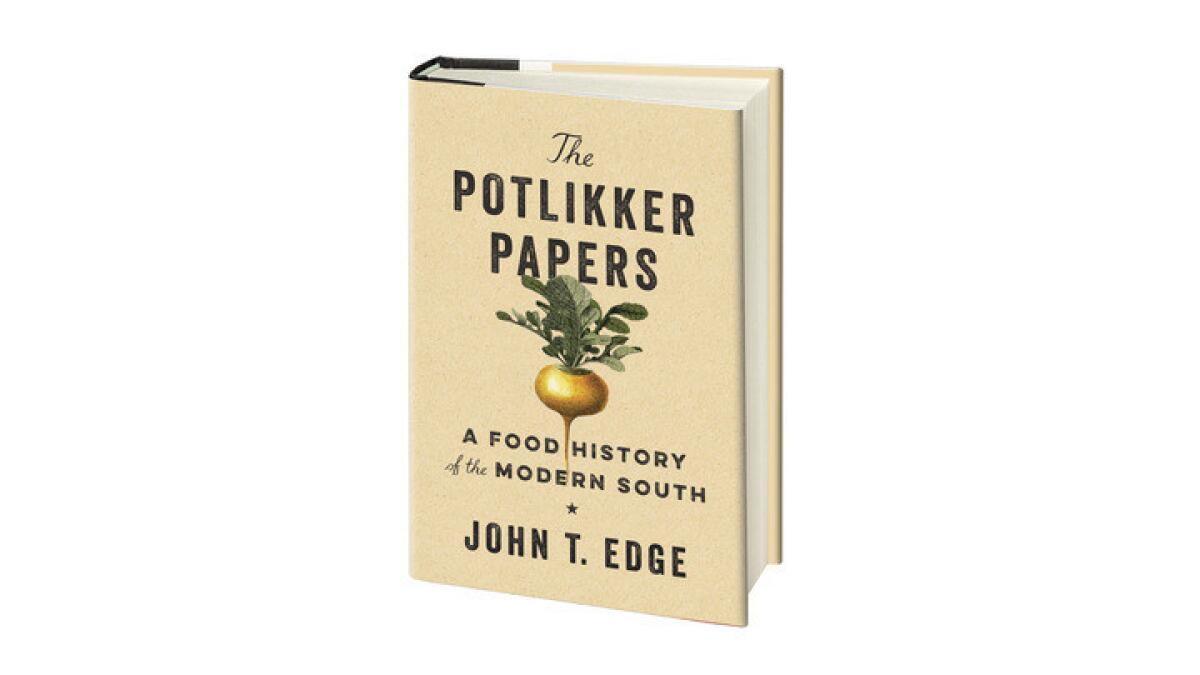Q&A: Talking with John T. Edge about Southern food, in and out of L.A.
It is a good time to be eating Southern food in Southern California. Los Angeles, of course, has long had Southern fare, but there’s been a particular interest in the region’s food of late, from the “redneck” platter at Manuela to the temples of hot fried chicken at Hotville Chicken and Howlin’ Ray’s to the Vietnamese-Cajun seafood boils that dot Little Saigon strip malls. If this current popularity of Southern food in L.A. has piqued your interest in the complex history underlying this region’s cuisine, then you’d do very well to pick up John T. Edge’s “The Potlikker Papers: A Food History of the Modern South,” which was published in May.
Edge is the director of the Southern Foodways Alliance and has written or edited more than a dozen books. In “The Potlikker Papers,” he focuses his lens on telling a history of Southern food (the title itself references the seasoned liquid left in a pot after greens have been boiled). He starts in 1955 with Georgia Gilmore, whose home kitchen was a stop for organizers during the civil rights movement, and ends in 2015 with a chapter about the region’s changing demographics. Recently, we spoke with Edge about his new book, the stories told and sold about the South and ways to think about the Southern influence in L.A. (This interview has been condensed and edited.)
MORE: Our cookbook selection »
Tell us about the genesis of “The Potlikker Papers.”
I initially thought I was going to write a book that was the post-Civil War South. [But] I recognized along the way that I'm definitively disinterested in the Civil War, and that the South I embrace, love and am also angry with begins to take shape as the civil rights movement comes into focus. And if you think about one of the propulsive moments of the movement, you come to the Montgomery bus boycotts.
In my research, I realized Georgia Gilmore could be a propulsive force in my book. And the best way I could pronounce what I intended was by opening my book with her. [Following the history to 2015] gave me a 60-year span, which is a neat, somewhat manageable span of time.

You’ve characterized this book as a people’s history of the South.
For much of the South's history, Southerners and those outside the region tended to dismiss or denigrate people of color and women. Here I sit, a white man saying that with as much clear-eyed vigor as I can manage.
I think if you're going to grapple with, and ultimately understand, how Southern food, the South and ultimately how America evolved over 60 years, then you're going to gravitate toward the stories of people of color and women. Certainly, I’m not telling new stories. These characters are known to smart folk. I’m hopefully framing their stories in new ways.
America’s relationship to food is maturing. It's not just pleasure or sustenance; it is a totem of identity.
— John T. Edge
While working on this book, was your focus influenced by the larger political climate?
Yeah, I’m writing in a moment wherein I recognize that America’s relationship to food is maturing. It’s not just pleasure or sustenance; it is a totem of identity.
I feel like this book shows up at a good time, not only because Americans are involved in conversations about appropriation and identity but also because it shows up as other smart books are stepping into the conversation. That’s what you want as a writer. You don’t want to speak into a void.
You dedicate your book to Jessica B. Harris.
When I first got interested in thinking and writing about food culture, I read Jessica’s work. Over a career of 40 years, she has become one of the primary researchers and interpreters of African American food culture. For a white son of the South who wants to apprehend his place, one of the things I was deeply interested in was getting a good handle on the import of African American food culture, in the South and beyond.
Do you have a sense of your place now?
I’m still struggling. I live in such a complicated place, a place long misunderstood by those outside and inside the region. It is a region wrapped in a caul of sentimentality, romance, mythos and lies; untangling that thicket is not so much a lifetime of work, it’s a generation.
I see the South limited by previous stories told about this place. I am determined to offer narratives for a South that might finally realize its democratic potentials.
L.A. restaurants have a history of trafficking in antebellum nostalgia, from the ’30s plantation-themed restaurants to the Ladies Gunboat Society, which opened in 2014 and was named after the women’s clubs that raised funds to build Confederate warships during the Civil War. How do you contextualize the South as being a more dynamic place than stories sold about it?
It depends on which story of the South you’re telling. Think about Vietnamese Cajun crawfish, which is a Gulf export interpreted in L.A. today. To me, what success looks like is connecting those two. Yes, there is the Gunboat Society kind of depiction of the South, and I’m not maligning that.
I ask, though, what when we consider interpretations of the South, we also consider Vietnamese American interpretation of Cajun Gulf Coast foodways as a part of the Southern dynamic in L.A. Those interpretations [alter] the conversation about who’s appropriating whom and who’s in power. It’s confoundingly beautiful.
ALSO:
10 places to go for great fried chicken in L.A.
At Manuela in DTLA, Jonathan Gold enjoys a ‘Redneck’ platter surrounded by fine art
Eat your way across L.A.
Get our weekly Tasting Notes newsletter for reviews, news and more.
You may occasionally receive promotional content from the Los Angeles Times.



